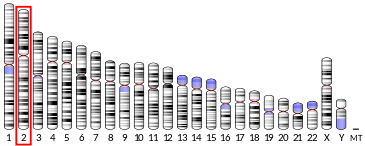Spastin
The human gene SPAST codes for the microtubule-severing protein of the same name, commonly known as spastin.[5]
This gene encodes a member of the AAA (ATPases associated with a variety of cellular activities) protein family. Members of this protein family share an ATPase domain and have roles in diverse cellular processes including membrane trafficking, intracellular motility, organelle biogenesis, protein folding, and proteolysis. The encoded ATPase may be involved in the assembly or function of nuclear protein complexes. Two transcript variants encoding distinct isoforms have been identified for this gene. Other alternative splice variants have been described but their full length sequences have not been determined. Mutations associated with this gene cause the most frequent form of autosomal dominant spastic paraplegia 4.[6]
See also
References
- 1 2 3 GRCh38: Ensembl release 89: ENSG00000021574 - Ensembl, May 2017
- 1 2 3 GRCm38: Ensembl release 89: ENSMUSG00000024068 - Ensembl, May 2017
- ↑ "Human PubMed Reference:".
- ↑ "Mouse PubMed Reference:".
- ↑ Roll-Mecak A, Vale RD (2008). "Structural basis of microtubule severing by the hereditary spastic paraplegia protein spastin". Nature. 451 (7176): 363–7. doi:10.1038/nature06482. PMC 2882799. PMID 18202664.
- ↑ "Entrez Gene: SPAST spastin".
External links
Further reading
- Kikuno R, Nagase T, Ishikawa K, et al. (1999). "Prediction of the coding sequences of unidentified human genes. XIV. The complete sequences of 100 new cDNA clones from brain which code for large proteins in vitro". DNA Res. 6 (3): 197–205. doi:10.1093/dnares/6.3.197. PMID 10470851.
- Hazan J, Davoine CS, Mavel D, et al. (1999). "A fine integrated map of the SPG4 locus excludes an expanded CAG repeat in chromosome 2p-linked autosomal dominant spastic paraplegia". Genomics. 60 (3): 309–19. doi:10.1006/geno.1999.5932. PMID 10493830.
- Hazan J, Fonknechten N, Mavel D, et al. (1999). "Spastin, a new AAA protein, is altered in the most frequent form of autosomal dominant spastic paraplegia". Nat. Genet. 23 (3): 296–303. doi:10.1038/15472. PMID 10610178.
- Fonknechten N, Mavel D, Byrne P, et al. (2000). "Spectrum of SPG4 mutations in autosomal dominant spastic paraplegia". Hum. Mol. Genet. 9 (4): 637–44. doi:10.1093/hmg/9.4.637. PMID 10699187.
- Santorelli FM, Patrono C, Fortini D, et al. (2000). "Intrafamilial variability in hereditary spastic paraplegia associated with an SPG4 gene mutation". Neurology. 55 (5): 702–5. doi:10.1212/wnl.55.5.702. PMID 10980739.
- Lindsey JC, Lusher ME, McDermott CJ, et al. (2001). "Mutation analysis of the spastin gene (SPG4) in patients with hereditary spastic paraparesis". J. Med. Genet. 37 (10): 759–65. doi:10.1136/jmg.37.10.759. PMC 1757167. PMID 11015453.
- Bürger J, Fonknechten N, Hoeltzenbein M, et al. (2001). "Hereditary spastic paraplegia caused by mutations in the SPG4 gene". Eur. J. Hum. Genet. 8 (10): 771–6. doi:10.1038/sj.ejhg.5200528. PMID 11039577.
- Hentati A, Deng HX, Zhai H, et al. (2000). "Novel mutations in spastin gene and absence of correlation with age at onset of symptoms". Neurology. 55 (9): 1388–90. doi:10.1212/wnl.55.9.1388. PMID 11087788.
- Svenson IK, Ashley-Koch AE, Gaskell PC, et al. (2001). "Identification and expression analysis of spastin gene mutations in hereditary spastic paraplegia". Am. J. Hum. Genet. 68 (5): 1077–85. doi:10.1086/320111. PMC 1226088. PMID 11309678.
- Svenson IK, Ashley-Koch AE, Pericak-Vance MA, Marchuk DA (2002). "A second leaky splice-site mutation in the spastin gene". Am. J. Hum. Genet. 69 (6): 1407–9. doi:10.1086/324593. PMC 1235553. PMID 11704932.
- Errico A, Ballabio A, Rugarli EI (2002). "Spastin, the protein mutated in autosomal dominant hereditary spastic paraplegia, is involved in microtubule dynamics". Hum. Mol. Genet. 11 (2): 153–63. doi:10.1093/hmg/11.2.153. PMID 11809724.
- Meijer IA, Hand CK, Cossette P, et al. (2002). "Spectrum of SPG4 mutations in a large collection of North American families with hereditary spastic paraplegia". Arch. Neurol. 59 (2): 281–6. doi:10.1001/archneur.59.2.281. PMID 11843700.
- Patrono C, Casali C, Tessa A, et al. (2002). "Missense and splice site mutations in SPG4 suggest loss-of-function in dominant spastic paraplegia". J. Neurol. 249 (2): 200–5. doi:10.1007/PL00007865. PMID 11985387.
- Morita M, Ho M, Hosler BA, et al. (2002). "A novel mutation in the spastin gene in a family with spastic paraplegia". Neurosci. Lett. 325 (1): 57–61. doi:10.1016/S0304-3940(02)00239-2. PMID 12023066.
- Sauter S, Miterski B, Klimpe S, et al. (2002). "Mutation analysis of the spastin gene (SPG4) in patients in Germany with autosomal dominant hereditary spastic paraplegia". Hum. Mutat. 20 (2): 127–32. doi:10.1002/humu.10105. PMID 12124993.
- Yabe I, Sasaki H, Tashiro K, et al. (2002). "Spastin gene mutation in Japanese with hereditary spastic paraplegia". J. Med. Genet. 39 (8): e46. doi:10.1136/jmg.39.8.e46. PMC 1735214. PMID 12161613.
- Proukakis C, Hart PE, Cornish A, et al. (2002). "Three novel spastin (SPG4) mutations in families with autosomal dominant hereditary spastic paraplegia". J. Neurol. Sci. 201 (1–2): 65–9. doi:10.1016/S0022-510X(02)00192-2. PMID 12163196.
- Ki CS, Lee WY, Han DH, et al. (2002). "A novel missense mutation (I344K) in the SPG4gene in a Korean family with autosomal-dominant hereditary spastic paraplegia". J. Hum. Genet. 47 (9): 473–7. doi:10.1007/s100380200068. PMID 12202986.
- Namekawa M, Takiyama Y, Sakoe K, et al. (2003). "A Japanese SPG4 family with a novel missense mutation of the SPG4 gene: intrafamilial variability in age at onset and clinical severity". Acta Neurol. Scand. 106 (6): 387–91. doi:10.1034/j.1600-0404.2002.01254.x. PMID 12460147.
- Starling A, Rocco P, Passos-Bueno MR, et al. (2003). "Autosomal dominant (AD) pure spastic paraplegia (HSP) linked to locus SPG4 affects almost exclusively males in a large pedigree". J. Med. Genet. 39 (12): e77. doi:10.1136/jmg.39.12.e77. PMC 1757223. PMID 12471215.





